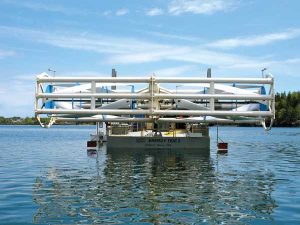Integrating and Sharing Data to Support Resilience in Coastal Maine Communities
![]() Institution: University of Maine
Institution: University of Maine
Sponsor: Senator George J. Mitchell Center for Sustainability Solutions
Understanding the barriers and opportunities for integrating and sharing data from disparate sources is critical to create more usable knowledge that fits within existing social and political structures. This project provides a five-stage solution to tailor data integration and information sharing to the specific needs and capacities of key stakeholder groups who affect or are affected by the process of tidal power development in Maine—state and federal regulators, industry developers, and a tribal environmental program.
The research team is:
- Inventorying existing data on environmental conditions in a proposed tidal power site
- Sharing summaries of data with stakeholders
- Integrating data based on stakeholder input
- Meeting with stakeholders to examine “usability” of integrated data and identify additional knowledge gaps
- Adapting the data integration and communication process to better meet stakeholder needs.
This co-produced process is necessary to ensure that tidal power development not only contributes to a brighter socio-economic future in Maine and beyond, but also proceeds in a manner that respects cultural identity and protects the long-term health of the surrounding marine ecosystem. While the team is focused on tidal power in Maine, outcomes of this research will be applicable to other contexts where project managers and regulators make major decisions that may affect the environment but who are constrained by a lack of available data in a form they can use.
Sustainability problem
 While calls to strengthen connections between science, technology, and management are now widespread, linking knowledge with action remains a significant challenge. A major barrier to bridging this gap is the current lack of “usable” knowledge to inform policy and management decisions. Researchers continue to collect data and produce valuable knowledge, yet this information is often not readily available, accessible, or presented in a form practical for practitioners and others to use in their day-to-day decisions.
While calls to strengthen connections between science, technology, and management are now widespread, linking knowledge with action remains a significant challenge. A major barrier to bridging this gap is the current lack of “usable” knowledge to inform policy and management decisions. Researchers continue to collect data and produce valuable knowledge, yet this information is often not readily available, accessible, or presented in a form practical for practitioners and others to use in their day-to-day decisions.
To enable more informed decision-making, increased attention must focus on how to integrate and more effectively share scientific information from disparate sources and spatial and temporal scales. Critical to this approach is a better understanding of the unique perspectives of different stakeholder groups with respect to what constitutes usable information. Such knowledge is necessary to ensure that the data collected are relevant, accessible, understandable, and presented in a form that fits the capacities and specific needs of diverse stakeholders at various stages of decision-making processes.
To address this need, our research focuses on knowledge co-production, integration, and sharing that directly supports decision-making for more resilient coastal communities. Tidal power is an exemplary problem for this research because decisions are occurring within the context of high system complexity (dynamic coastal environment) and significant uncertainty (nascent technology development).
Demonstration and testing of new technologies have produced narrowly-focused knowledge on potential effects of tidal power on marine animals, habitats, and ecosystems. For example, in Maine, site assessment data have been collected by a tidal power developer, Ocean Renewable Power Company (ORPC). This includes information on underwater topography, tidal current dynamics, underwater noise levels, and benthic or bottom-dwelling species.
Further, UMaine research has contributed data on fish interactions with tidal devices and documented local ecological knowledge of marine species (fish, mammals, birds). Yet, these data remain relegated to narrow technical reports, inaccessible academic papers, and in some cases, stored as raw data in spreadsheets or as handwritten notes.
Separate datasets are cumbersome to share with stakeholders. Integration of datasets into a more meaningful and usable form may enable a more complete understanding of the ecosystem and result in better uptake by decision-makers. New approaches are needed to increase information sharing and inform impending and future projects. Building upon their prior short-term pilot project, the Cobscook Bay Tidal Energy Project (CBTEP), ORPC’s recently initiated process to license a larger-scale tidal power project in Western Passage (WP) presents an ideal opportunity for this research in Maine.
Stakeholders and engagement
Project stakeholders include federal (National Oceanic and Atmospheric Administration) and state (Maine Department of Environmental Protection) regulators, a Maine-based tidal power developer (ORPC), and the Sipayik Environmental Program of the Passamaquoddy Tribe.
Team Leader
Jessica Jansujwicz, Assistant Research Professor, Department of Wildlife, Fisheries, and Conservation Biology, Mitchell Center Faculty Fellow
UMaine Team Members:
- Gayle Zydlewski, Associate Professor, School of Marine Sciences, Mitchell Center Faculty Fellow
- Caroline Noblet, Assistant Professor, School of Economics, Mitchell Center Faculty Fellow
- Laura Rickard, Assistant Professor, Department of Communication and Journalism, Mitchell Center Faculty Fellow
- Kristina Cammen, Assistant Professor, School of Marine Sciences, Mitchell Center Faculty Fellow
- Sandra De Urioste-Stone, Assistant Professor, School of Forest Resources, Mitchell Center Faculty Fellow
- Louise McGarry, Research Associate, School of Marine Sciences
- Teresa Johnson, Associate Professor, School of Marine Sciences, Mitchell Center Faculty Fellow
- Chris Bartlett, Cooperative Extension and Maine Sea Grant, Marine Extension Associate,
- Gabriella Marafino, Graduate student, School of Marine Sciences
External Partners
